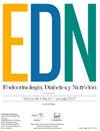整合大数据分析,研究肢端肥大症与癌症之间的关系。
IF 1.8
4区 医学
Q4 ENDOCRINOLOGY & METABOLISM
引用次数: 0
摘要
目的利用自然语言处理系统和大数据分析评估肢端肥大症与癌症及不同类型癌症之间的关联:我们利用西班牙马德里 Puerta de Hierro Majadahonda 大学医院电子健康记录(EHR)中的数据开展了一项观察性、回顾性研究。研究采用人工智能技术提取电子病历中的信息,并使用 Savana Manager 4.0 软件进行分析:在708047名登记患者(54.7%为女性)中,544名患者(0.08%;330名女性,60.7%;诊断时平均年龄(53.0±15.8)岁)被诊断为肢端肥大症。肢端肥大症患者与非肢端肥大症患者相比,癌症发病率更高(7.7% vs 3.9%,p):我们的研究基于人工智能技术和对现实世界数据与信息的分析,揭示了肢端肥大症与癌症之间的显著关联,在我们医院的人群中,主要是肢端肥大症男性,尤其是结直肠癌、膀胱癌和淋巴瘤的发病率较高。本文章由计算机程序翻译,如有差异,请以英文原文为准。
Integration of big data analytics in the investigation of the relationship between acromegaly and cancer
Objective
To evaluate the association between acromegaly and cancer and different types of cancer by using natural language processing systems and big data analytics.
Material and methods
We conducted an observational, retrospective study utilizing data from the electronic health records (EHRs) of Hospital Universitario Puerta de Hierro Majadahonda, Madrid, Spain. Information from the EHRs was extracted using artificial intelligence techniques and analyzed using Savana Manager 4.0 software.
Results
Out of a total of 708,047 registered patients (54.7% females), 544 patients (0.08%; 330 women, 60.7%; mean age at diagnosis 53.0 ± 15.8 yr) were diagnosed with acromegaly. The incidence of cancer was higher in patients with acromegaly vs those without this condition (7.7% vs 3.9%, p < 0.001; OR, 2.047, 95%CI, 1.493–2.804). Male acromegalic patients had a higher prevalence of cancer vs females (57.1% vs 42.9%, p = 0.012). A significantly higher prevalence of colorectal cancer (2.9% vs 1.4%, p = 0.006), bladder cancer (1.1% vs 0.3%, p = 0.005), and lymphoma (1.1% vs 0.3%, p = 0.009) was observed in patients with acromegaly vs those without the condition. Acromegalic men had significantly higher prevalence rates of colorectal cancer (4.7% vs 1.3%, p = 0.001), bladder cancer (2.8% vs 0.4%, p < 0.001), breast cancer (0.9% vs 0.2%, p = 0.042), gastric cancer (0.9% vs 0.1%, p = 0.011), lymphoma (1.4% vs 0.3%, p = 0.037), and liver cancer (0.9% vs 0.1%, p = 0.012) vs non-acromegalic men. On the other hand, acromegalic women showed a higher prevalence of thyroid cancer (1.2% vs 0.4%, p = 0.043) vs non-acromegalic women.
Conclusion
Our study, based on artificial intelligence techniques and analysis of real-world data and information, revealed a significant association between acromegaly and cancer in our hospital population, mainly acromegalic men, with a higher frequency of colorectal cancer, bladder cancer and lymphoma in particular.
求助全文
通过发布文献求助,成功后即可免费获取论文全文。
去求助
来源期刊

Endocrinologia Diabetes Y Nutricion
Multiple-
CiteScore
2.10
自引率
10.50%
发文量
99
期刊介绍:
Endocrinología, Diabetes y Nutrición is the official journal of the Spanish Society of Endocrinology and Nutrition (Sociedad Española de Endocrinología y Nutrición, SEEN) and the Spanish Society of Diabetes (Sociedad Española de Diabetes, SED), and was founded in 1954.
The aim of the journal is to improve knowledge and be a useful tool in practice for clinical and laboratory specialists, trainee physicians, researchers, and nurses interested in endocrinology, diabetes, nutrition and related disciplines.
It is an international journal published in Spanish (print and online) and English (online), covering different fields of endocrinology and metabolism, including diabetes, obesity, and nutrition disorders, as well as the most relevant research produced mainly in Spanish language territories.
The quality of the contents is ensured by a prestigious national and international board, and by a selected panel of specialists involved in a rigorous peer review. The result is that only manuscripts containing high quality research and with utmost interest for clinicians and professionals related in the field are published.
The Journal publishes Original clinical and research articles, Reviews, Special articles, Clinical Guidelines, Position Statements from both societies and Letters to the editor.
Endocrinología, Diabetes y Nutrición can be found at Science Citation Index Expanded, Medline/PubMed and SCOPUS.
 求助内容:
求助内容: 应助结果提醒方式:
应助结果提醒方式:


